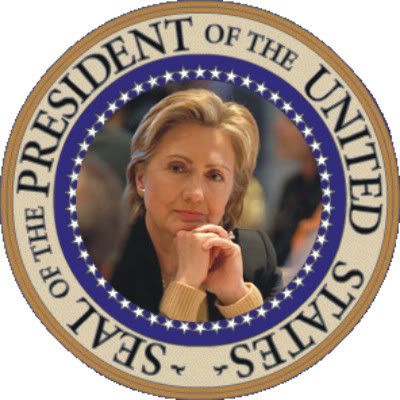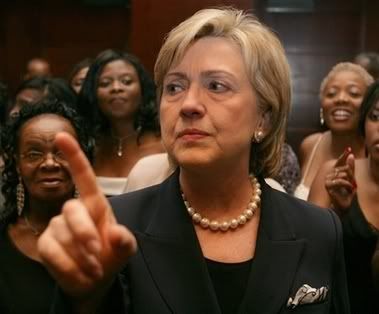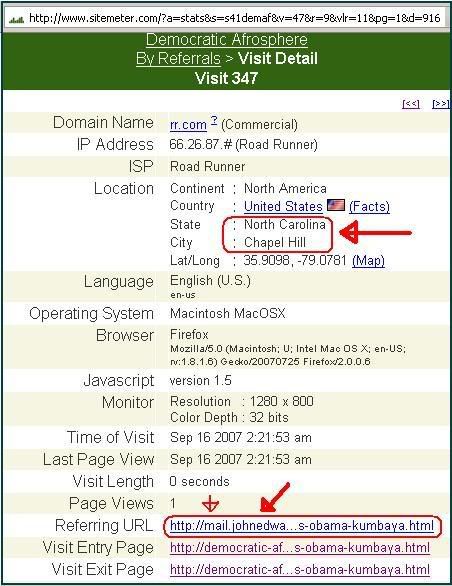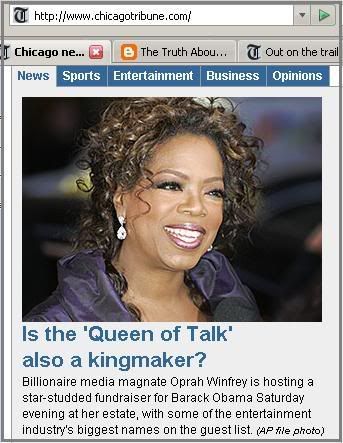Cross-posted at the Francis L. Holland Blog.
One of the most substantial objections of the Left against Hillary Clinton's candidacy is her 2002 "yes" vote on the Iraq War Resolution, as well as the well-fanned fear that she might prolong the Iraq War when she is elected president in 2008, and even invade Iran. The IWR complaint is legitimate, but the substantial apprehensions about her intentions for Iraq and Iran are based on fear rather than logic.
Having studied the Clintons closely over the last 15 years, I believe I can help readers to understand Hillary Clinton better, although what I offer, while supportive overall, may make some readers like Clinton even less and infuriate her supporters as well as her detractors. That will be my goal from now until the inauguration of President Hillary Clinton in January, 2009.
I also hope to offer facts and reasoning to undermine the spurious rationalizations of the 43-term white male monopoly of the presidency, and the white male supremacy paradigm in general. Therefore, much of what I write about Hillary's race will be useful to Barack Obama and future minority and women candidates for any office, as much as it helps Hillary Clinton in 2008.
Today, I address the question, "What would President Hillary Clinton do with Iraq and Iran beginning in January 2009?" Some on the Left are arguing that, if elected president, Hillary Clinton will continue the war in Iraq and maybe even invade Iran. However, a careful analysis of the history of Clintonism and of the Iraq War prove that the opposite is most likely to occur.
When Hillary voted "yes" on IWR in 2002, every thinking Democrat, including Senator Hillary Clinton, knew that President George W. Bush was corrupt and that his war would, in all likelihood, be an utter failure, militarily and diplomatically, in the long term.
So, why did John Edwards, Joe Biden, John Kerry, Tom Harkin, Evan Bayh and Hillary Clinton all vote "yes" on the Resolution? PBS noted on September 18, 2002,
A recent poll released by ABC News said 68 percent of the American public support military action against Iraq, an increase of 12 percentage points from August. PBS
On March 17, 2003 USA Today reported,
By a 2-to-1 ratio, Americans favor invading Iraq with U.S. ground troops to remove Saddam Hussein from power. Not since November 2001 have they approved so overwhelmingly. ( . . . ) By a ratio of more than 2-to-1, most Americans say the Bush administration has done a good job handling diplomatic efforts with other nations. USA Today
John Edwards, Joe Biden, John Kerry, Tom Harkin, Evan Bayh and Hillary Clinton voted "yes" on IWR because they knew that:
(a) the war was popular among much of the American public at the time, including a substantial part of the Democratic Party (the part most willing to consider voting for Republicans in subsequent elections), and voting against a significant part of the public's wishes would carry a heavy political price, and
(b) voting against the war, even though correct on the merits, would make them forever vulnerable to being cast by Republicans as yellow-bellied pacifists, which might well end their Senate careers and which would certainly prevent them from ever becoming president of the United States. Because, no politician who is perceived as a yellow-bellied peacenik has ever won the presidency.
In essence, they voted for the war out of political expediency or political reality, depending upon how generous you want to be. They believed that it would be impossible to assemble a governing majority behind a Democratic presidential candidacy in the future otherwise.
If Hillary's vote for the IWR makes her "unqualified," then it must logically also render Senators [John Edwards,] Joseph Biden, Tom Harkin, Evan Bayh, and John Kerry "unqualified," because qualifications are not subjective, they are objective [applying to everyone equally]. Francis L. Holland's DailyKos Diary, November 19, 2006.
As it was, Hillary voted "yes" on IWR, and then still did extremely well in her 2006 re-election bid. Clinton's Resounding Victory Sets the Stage Both in New York and nationally, it was more politically risky to strongly oppose the IWR than to support it.
Another way to understand (without necessarily approving of) Clinton's vote is to remember that the Clinton family's successful strategy for winning the presidency has been to be perceived as centrists. When you consider the number and names of the Democratic US Senators who voted "yes" on the IWR in 2002, you realize that Clinton would have converted herself into a publicly perceived Leftist outlying anomaly if she had opposed IWR, while these 28 other Democratic senators voted for it: Baucus, Bayh, Biden, Breaux, Cantwell, Camahan, Carper, Cleland, Daschle, Dodd, Dorgan, Edwards, Feinstein, Harkin, Hollings, Johnson, Kerry, Kohl, Landrieu, Lieberman, Lincoln, Miller, Nelson, Nelson, Reid, Rockefeller, Schumer and Toricelli. US Senate IWR Roll Call
So, Hillary Clinton's 2002 motives ultimately are quite clear and clearly were not very different from the motives of the other candidates and potential candidates - to preserve her political career and, ultimately, the presidential electability of herself and Democrats in general.
Although readers may have a different theory of how these elected leaders proceeded, it is really fairly obvious why they did what they did. And no one can say with utter certainty that the Democrats would now be ascendant if they had vigorously opposed Bush's war back in 2002. They are ascendant because Bush's war went forward disastrously. So, here I am not talking about what they should haveSHOULD have done, but rather discussing what they actually DID do and why they did it.
It's quite clear now that voting AGAINT the IWR in 2002 was NOT a sure winner with voters, then or now. If voting "no" in 2002 guaranteed victory with voters, then Barack Obama (who opposed the war from the outset) would be ahead of Clinton and Russ Feingold (who voted against the war) would be leading the pack in the presidential race. As it is, Clinton is polling ahead of Obama and Russ Feingold is out of the race entirely, having made a calculation that even his principled "no" vote on IWR was no guarantee of electoral victory in 2008. Americans want a strong president and her ability to be perceived as such is what Clinton defended by voting "yes" on IWR in 2002.
By now, most of the readers are furious with me, but that's alright. My purpose here is to not to please readers, but rather to examine what that history tells us Hillary Clinton would do as president, with Iraq and Iran starting in 2009. The answer is paradoxical, but clear:
If political considerations compelled Clinton's vote "yes" on IWR in 2002, the very same political considerations - the public will and the preservation of her career, would compel her to withdraw troops from Iraq in 2009 and to refrain from starting a half-baked war with Iran.
When Bill Clinton was in office, the Republicans and many Democrats constantly accused him of "government by polls," a leadership strategy that infuriated the Republicans because it repeatedly and successfully rallied public support behind the Democratic President, Bill Clinton. Quoting the Washington Post, The Nation said of Bill Clinton's pollster, Mark Penn,
"In a White House where polling is virtually a religion," the Washington Post reported in 1996, "Penn is the high priest." The Nation
In fact, as far back as 1992, the Clintons were accused by Republicans and Democrats of operating a poll driven candidacy and presidency, and of doing whatever they thought was most popular with the American public - "government by polls." Bill Clinton's pollster, Mark Penn, is now Hillary Clinton's pollster today.
In light of our experience with the Iraq War, would presidential decision-making , "government by polls," really be so bad today? Isn't our foremost argument for ending the war the fact that Americans overwhelmingly oppose it? If we had a president today who was guided by the wisdom of the popular will, as represented by polling data, as Bill Clinton was, then the she would immediately withdraw from Iraq, because the public doesn't support the war.
It is crucial to distinguish between the role of the legislator in making war and the role of the president. When war is to be made, it is made because the president convinces the public of the necessity, not the other way around. In fact, the last US intervention motivated by the popular will was probably WWII.
In 2008, can we afford to risk electing another president who exclusively "does what he thinks is right" in Iraq instead of electing a president who does what the electorate most desires? What if an inexperienced president is unable to forge a peace and decides that more war is necessary, "because he thinks it's right"?
The Washington Post said,
If Clinton seems cautious, it may be because [Mark] Penn [her pollster] has made caution a science, repeatedly testing issues to determine which ones are safe and widely agreed upon (he was part of the team that encouraged Clinton's husband to run on the issue of school uniforms in 1996).
( . . . )
Yet [Mark] Penn also has everything that Clinton would want in a senior consultant: undisputed brilliance and experience, according to even his enemies; clear opinions, with data to back them up; unwavering loyalty; and a relentless focus on the endgame: winning the general election. And Clinton clearly adores him. She describes Penn in her autobiography, "Living History," as brilliant, intense, shrewd and insightful. Clinton's Power Pointer
If it's true that the Clintons were and are very much poll-driven, it must also be true that a polls telling them the Iraq War is extremely unpopular would lead them to wind down the Iraq War.
President Bill Clinton refused to prolong the involvement in Somalia and refused to intervene in Rwanda precisely because he knew (a) that the United States could not prevail in these conflicts without massive loss of US lives and (b) the American public would not forgive Clinton that loss of life because the did not perceive that US interests were sufficiently at stake. Certainly, Clinton could have tried, as Bush repeatedly has, to whip the country into a war-making fury. Unlike Bush, Clinton understood that the public's patience would quickly wear thin in the face of mounting causalities and back-to-back military defeats.
Although Hillary Clinton voted for IWR in 2002, along with too many others, today, the political climate has changed, the rationale for the Iraq War has been utterly discredited, and the vast majority of Americans have become convinced that the war cannot be won and that Bush has the country on the wrong track. The troops should come home. With the 2012 re-election campaign in mind, what would Hillary Clinton do under these circumstances?
As her position has evolved, from initial support for President Bush to fierce criticism of the war's management, Clinton has sought a careful balance, one that maintains her image of strength on national security while not antagonizing the staunchly antiwar elements of her party. WaPost Article
Unlike George W. Bush at present, history would seem to indicate that Hillary Clinton is going to be heavily guided by poll numbers as she decides what to do with Iraq. And what do the polls say? Americans want to get out of Iraq as quickly as is safely possible. In fact, Clinton's position has tracked the American mood and Clinton has adopted precisely that position.
Indeed, Rich Lowry, a conservative critic who literally wrote a book on criticizing the Clintons, calls Bill Clinton a "hyper-cautious" and "poll-driven." If that is so, would a poll-driven President Hillary Clinton, with an electoral mandate to bring the troops home, instead maintain the war in Iraq, losing more and troops daily? Obviously a poll-driven president would do exactly the opposite, knowing that she must stand for re-election in four short years, most of which will be spent campaigning as well as governing.
And what of invading Iran? Would a "hyper-cautious" "poll-driven" president invade Iran? The only Americans who want to invade Iran are the neo-conservatives and even they perceive a need to propagandize the public and lie a lot more before doing so.
In 2009, a poll-driven Clinton president would bring the troops home, because that's what most Americans want, but she would also be careful to avoid a civil war - a war for which she would inevitably be blamed, because polls would show that such a result would be very unpopular.
Like poll-driven Bill Clinton in Somalia and Rwanda, she would weigh the US interest in saving Iraq lives against the US determination to avoid American casualties. So, she would do exactly what she says she would do: emphasize negotiation and peacemaking while redeploying US troops out of harm's way, with UN and multinational involvement in a peaceful resolution to the conflict, like in Bosnia.
And what of Iran? A "hyper-cautious" Clinton president would avoid combat with Iran like the plague, because such combat, obviously, would spiral into an all-out regional conflict whose results would be utterly unpredictable. Hyper-cautious presidents do not engage in unpredictable wars whose goals and objectives are specious and uncertain. Bush was not hyper-cautious. Hillary Clinton clearly is.
So, in 2009, both in terms of Iraq and Iran, a poll-driven, hyper-cautious president is exactly what the American Left needs to wind down the Iraq war and avoid starting another similar war in Iran.
Mark Penn, Clinton's chief pollster, has said,
We might all learn a lesson from Bill Clinton in 1992. He won by making the Persian Gulf War irrelevant to the election. He focused on swing voters, with plans for welfare reform and middle-class tax cuts, and he drove the economy, not the war, as the central defining issue. In 1996, he focused on a plan to balance the budget and cruised to a landslide victory. Mark Penn, Myth of the Vanishing Swing Vote
The Iraq War will not be irrelevant in the 2008 election. But, if Clinton can convince America that she will successfully wind down the Iraq War, then America will become willing to turn its attention to its domestic needs.
At no time during the eight years that Bill Clinton was in office, with Mark Penn as his pollster, did they opt for war as a way to drive their poll numbers or to achieve any other political objective. In spite of, or perhaps because of their craven addiction to polling, Bill Clinton NEVER, EVER - not once - took the US to a significant war or offensive war during his eight years in office.
Once elected, the president sets the agenda in international affairs. With President Bill Clinton setting the national agenda, the polling always confirmed that while America wanted a strong president and wanted to feel safe, it also wanted peace instead of war. Bill Clinton NEVER sought to convince America that an unnecessary was necessary, the proof being that he never took America to war at all.
The Clintons habitually don't win presidential elections by starting new wars or by perpetuating old ones. They win by convincing voters that they can and will work for peace internationally, successfully prosecuting any war ably if a war becomes necessary, but, deftly refocusing the country's attention to its domestic needs, like national health care, because most wars really are optional.
Some readers will demand to know, "What about the issues where doing what's right is un-popular?" Such readers should reflect on Bill Clinton's 1993 determination to let gays serve openly in the military. Clinton took that position because (1) it would fulfill a campaign promise that was popular with his base, and (b) it was the right thing to do whether it was popular or not. It should also be remembered that even poll driven decisions require great leadership; There are often several courses of action that are potentially politically expedient, and the president chooses among them based on his/her values.)










